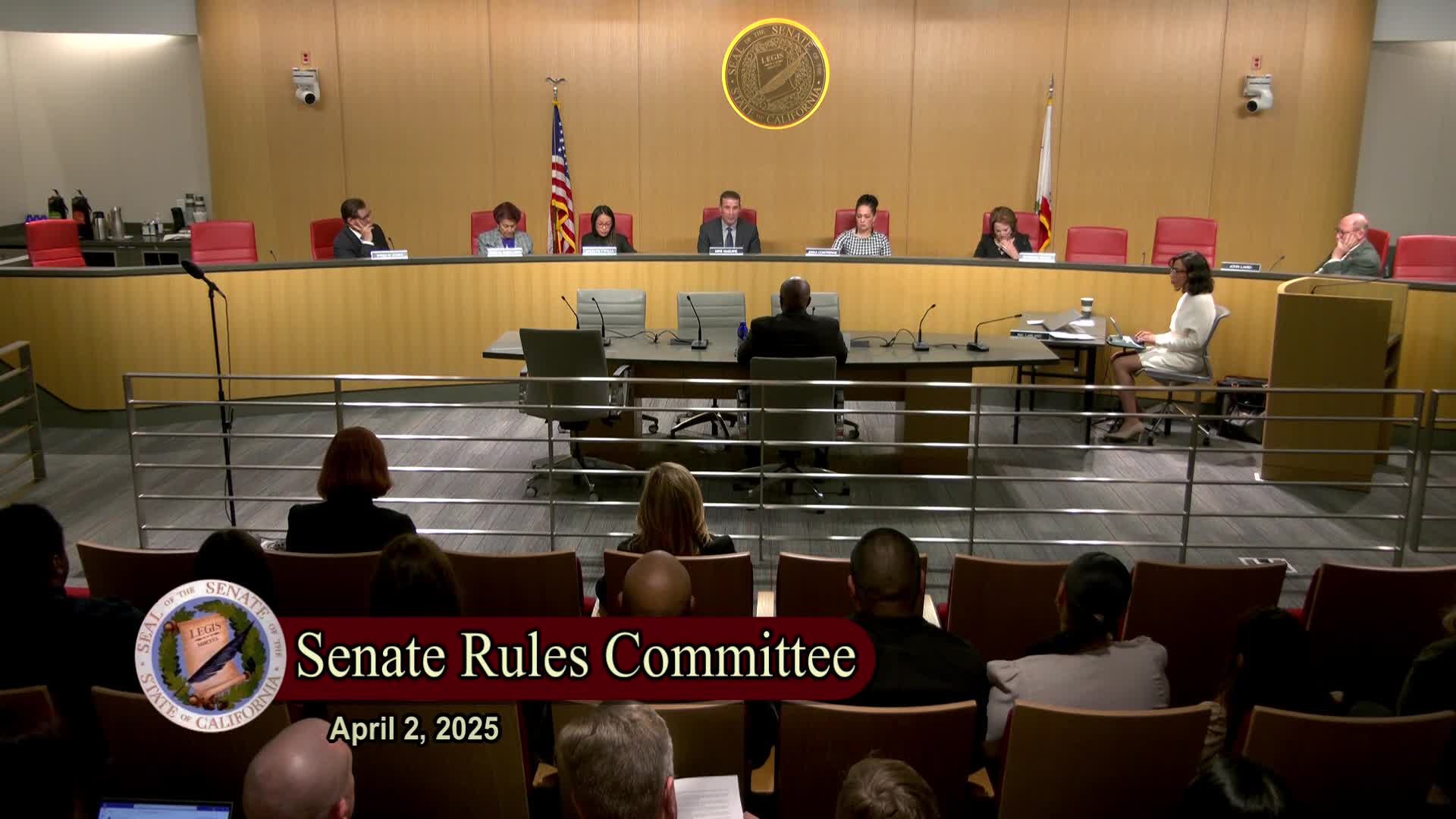Senate rules panel advances Jason Wimbley to full Senate after discussion of LIHEAP, CSBG and weatherization funding
Get AI-powered insights, summaries, and transcripts
Subscribe
Summary
The California State Senate Rules Committee voted 5-0 to advance Governor Gavin Newsom’s nominee Jason Wimbley to the Senate floor as director of the Department of Community Services and Development after questioning about LIHEAP layoffs, CSBG oversight and greenhouse gas reduction fund allocations.
The California State Senate Rules Committee advanced Jason Wimbley to the full Senate on a 5-0 vote after committee members questioned him about federal LIHEAP staffing reports, Community Services Block Grant oversight and recent greenhouse gas reduction fund allocations.
Wimbley, nominated by Gov. Gavin Newsom to lead the Department of Community Services and Development (CSD), told the committee he began his career at CSD as a file clerk and rose to chief deputy director. “CSD’s mission is to improve the economic security of vulnerable Californians through programs and partnerships,” Wimbley said in his opening remarks, citing weatherization, energy bill assistance and crisis intervention services administered through federal and state programs and local partners.
The committee focused much of its questioning on the Low Income Home Energy Assistance Program (LIHEAP) after Senator Laird cited news reports of federal staff layoffs. Senator Laird asked Wimbley what the reported Washington layoffs might mean for California’s share of LIHEAP funding. Wimbley said CSD was tracking reports of layoffs and assessing potential impacts but that “it is too early to speak to that.” He explained that LIHEAP funds support a range of services including home weatherization, emergency heating and cooling repairs, and financial assistance to restore utility services for clients facing disconnection.
Committee members pressed for details about state funding and program continuity. Wimbley said historically the state has supplemented federal LIHEAP dollars in limited circumstances (he cited early-2000s energy-crisis supplements) but that generally CSD administers the levels funded by the federal appropriation. He told the committee that California had received about 90% of last year’s LIHEAP funding allocation and that a continuing resolution signed in March provided level funding through the end of the federal fiscal year.
Members also asked about the Community Services Block Grant (CSBG), which CSD contracts to local community action agencies. Wimbley said CSD contracts with more than 60 community action organizations statewide and described CSBG as a flexible federal funding source used to address local poverty-related needs. He said agencies must complete comprehensive needs assessments to guide local use of CSBG dollars and that CSD performs on-site and desk monitoring, financial reviews and outcome reporting. “Our monitoring visits and oversight has not detected any significant irregularities,” Wimbley told the committee, while acknowledging routine compliance matters that can require correction.
Senators asked about a reported drop in allocations from the state’s Greenhouse Gas Reduction Fund for CSD programs. Wimbley described two LIHWAP-related programs that have previously received those funds — a farmworker housing program and a multifamily program for affordable housing energy upgrades — and said award cycles often reflect spending timelines and permitting requirements for large retrofits. He said contracts remain in place even when a new appropriation is not reflected in the current budget and offered to follow up with the committee on the specific $37 million decrease they flagged.
Public testimony at the hearing included multiple CSD local partners and advocates who spoke in support of Wimbley’s confirmation. Speakers representing California community action agencies, housing advocates and municipal utility associations described long-standing working relationships with Wimbley and urged confirmation.
The committee voted unanimously to advance Wimbley’s nomination. The motion to send the nomination to the Senate floor was moved by “Madam Vice Chair” (as recorded in the hearing) and passed 5-0 on a roll call that recorded Maguire, Grove, Caballero, Jones and Laird voting aye.
The nomination will next be considered by the full California State Senate.
